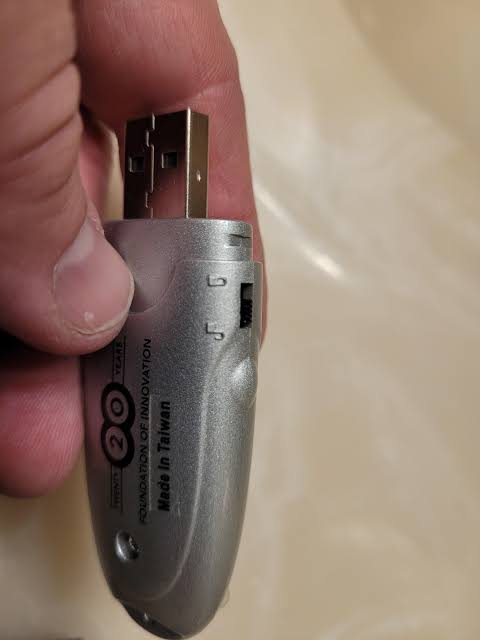Background
I have had the same Kingston DataTraveller DTSE9 since around 2010, when I was still in school. I’ve carried it on my keychain for at least 12 years and it still works, its “the old reliable”.
That said, it’s slow. Very slow. I use it mostly as a boot USB for Linux / Windows, so I need several sticks with decent random read speed, and decent write speed for when I update them.
My criteria were:
- All-metal construction for durability, including the keychain loop
- Sits well on a keychain next to keys
- Reasonable speed, including random reads.
Testing method
I evaluated the sticks in two ways.
I ran CrystalDiskMark with 256 MiB (x5) configuration.
I also measured the angle at which the USB stick sits on a keyring. I found that several of them could not sit perpendicular to a keyring it because of their geometry, which makes it difficult to comfortably use them next to keys.
At the datum of 0 degrees, the key sits perpendicular to the keyring.
Results
The competitors
Here are the 6 main competitors in this space I bought.
All transfer units are in MB/s.
| Product | Price (£) | Angle on keyring (0deg is best) | Sequential reads Q8T1 | Sequential reads Q1T1 | Random reads Q32T1 | Random reads Q1T1 | Sequential writes Q8T1 | Sequential writes Q1T1 | Random writes Q32T1 | Random writes Q1T1 |
|---|---|---|---|---|---|---|---|---|---|---|
| Corsair GTX 128GB | 65 (256GB version) | 0 | 470.214 | 429.330 | 157.436 | 19.390 | 436.990 | 414.201 | 166.829 | 38.937 |
| Samsung Bar 64GB | 10 | 55 | 305.424 | 305.268 | 14.517 | 13.428 | 36.434 | 36.247 | 20.537 | 21.619 |
| Kingston DTSE9G3 64GB | 11 | 0 | 246.705 | 244.496 | 13.756 | 13.028 | 100.236 | 110.054 | 0.484 | 0.474 |
| Integral Arc 3 | 10 | 0 | 162.336 | 161.338 | 15.567 | 11.188 | 49.457 | 47.965 | 5.032 | 4.244 |
| Kingston DataTraveller Micro 64GB | 11 | 0 | 247.000 | 245.247 | 13.788 | 12.961 | 100.932 | 101.292 | 0.496 | 0.470 |
| Sandisk Ultra Luxe 64GB | 12 | 25 | 403.863 | 399.974 | 12.438 | 12.054 | 91.835 | 91.685 | 4.272 | 4.258 |
Some additional notes:
- The Samsung Bar had really sharp corners. You might need to file them down like I did.
- Corsair GTX: the 128GB version is no longer available and the lowest capacity is 256GB. It’s more of a portable SSD in the form of a USB stick, which makes it really fast, but it’s bulkier than a normal USB stick, though not by much. Often it takes up more than one USB port because it’s wide. It’s still very good and I recommend it.
Other devices
Some related products I own but don’t qualify for this comparison but are offered up here for context.
Here’s why they don’t qualify.
-
Crucial P3 Plus: It’s an NVME SSD. Can be made portable with a good enclosure, but too bulky for what I’m looking for.
-
Samsung 860 Evo: It’s a SATA SSD, definitely not the right form factor.
-
Sandisk Ultra Curve: I bought this thinking it was made out of metal, but it was not. It’s fairly flimsy plastic.
-
Kingston DTSE9 16GB: This is my old stick. The old reliable. No longer sold, but I’ve tested its successor.
-
Samsung SD Card: It’s a 2016 MicroSD card connected to my PC via a MicroSD-SD adapter and a USB card reader. I included this as a meme.
| Product | Sequential reads Q8T1 | Sequential reads Q1T1 | Random reads Q32T1 | Random reads Q1T1 | Sequential writes Q8T1 | Sequential writes Q1T1 | Random writes Q32T1 | Random writes Q1T1 |
|---|---|---|---|---|---|---|---|---|
| Crucial P3 Plus M.2 NVME 2TB | 1598.227 | 1332.131 | 305.220 | 46.643 | 1560.989 | 1452.256 | 238.134 | 102.502 |
| Samsung 860 Evo SATA 1TB | 564.446 | 539.913 | 272.631 | 43.322 | 536.440 | 518.168 | 238.752 | 101.313 |
| Sandisk Ultra Curve | 160.091 | 158.859 | 9.271 | 9.043 | 58.680 | 60.377 | 2.902 | 3.209 |
| Old Kingston DTSE9 16GB | 18.452 | 18.220 | 8.473 | 8.096 | 13.626 | 13.629 | 0.115 | 0.026 |
| Samsung Memory Pro Plus Micro SD Card | 20.765 | 20.969 | 5.146 | 5.102 | 19.493 | 20.316 | 2.181 | 3.421 |
Conclusion
There are no clear winners in this fight.
- The Corsair GTX is the fastest in all categories by a country mile, but has a larger form-factor than other entries and higher price. Very good, but not for everyone.
- Samsung Bar has the fastest random writes, and decent performance in other metrics for its USB stick form factor, but sits awful on a keychain due to the angled hole.
- The Integral Arc 3 has solid random performance, but worst sequential performance than the rest.
- Sandisk Ultra Luxe gets the best overall balance of performance, but does not sit on the keychain super well.
- The two Kingston’s perform effectively the same, with the Micro being much more compact. That said, that can be a disadvantage on a keyring if there are adjacent items.
- All competitors (bar the GTX) had similar random reads.
For me, I’d say the right choice is either the Kingston DTSE9G3. It’s a nice upgrade over my old DTSE9 and sits nicely next to it’s grandfather. If I needed any random writes though, for copying lots of small documents like code files, I’d pick the Integral Arc 3.
Oh my god, thank you so much for this. I have always had the hardest time finding these exact same requirements, and this is perfect. All metal construction and coexisting with keys has always been a priority for me, but it seems like everyone is inexplicably fine with copping out by just dangling their data on this flimsy little string tied to a brittle plastic case and I cannot understand it.
I’m not currently looking for one at this exact moment, but I will be returning here when I am. You’re doing the lord’s work out here!
Others have said this but THANK YOU SO MUCH! This is extremely valuable info for me as I pretty much only want full metal flash drives. I have a couple Samsung Bars, and I will absolutely snag a GTX.
deleted by creator
8GB in 2007?! How much did that cost?
deleted by creator
Still have the 4GB version of this one somewhere. Bought in the same year
Served be well over the years
Mine has been relegated to BIOS updates, still doing a great job just a bit small these days.
Shit I had one of those. Now I’m feeling all nostalgic remembering fidgetting with the slider
deleted by creator
Still have this same usb stick and it works flawlessly
I bought 2, probably around the same time. One of them failed after years of serving as my NAS boot drive, so I replaced it with its twin, and that one is still going strong.
That’s the highest Scoville rating I’ve seen on a USB stick
deleted by creator
had a bunch of these, the ones with U3 partitions were super hack tools, could autorun apps and scripts like a CD, windows didn’t know wtf to do.
deleted by creator
This is comprehensive, and impressive. Good job. Saving this post for my next purchase.

One of these took me through university in 2002
I really miss the hardware read only switch.
Computer labs did not have front USB back in those days, so we had to choose between floppies or diving under the desks. I was in the diver club.
32MB was massive for documents at the time. It could hold your entire academic life back then.
Afaik, if it works the same as SD, it just tells the OS/device nicely to not write. Not very secure.
I believe there are small microSD adapters that ensure read only so ymmv
No, back in those days these were very much hardware/firmware based. It’s a decade before the SD standard.
I remember 256MB sticks were a game changer for me. 1TB still seems unnecessarily to me. You carrying Wikipedia in there?!
Wikipedia is only 110GB… https://library.kiwix.org
is that just the text
Nope
seems implausible.
I carry around PowerPoint presentations that contain huge loops of satellite data. I love my 1TB USB stick.
32MB was massive for documents at the time. It could hold your entire academic life back then.
Nowadays you need like 32 Gigabytes lol
Oh I forgot about those switches. I think that means I probably don’t really miss them, I mean, it’s not like putting something on it necessarily deletes what’s on there and it’s kind of hard to accidentally write to one.
It’s also from a period where Windows machines were riddled witb viruses that spread by USB. This prevented your drive from getting infected.
There’s one out there, named something like kangaroo, where they actually have signed firmware, and a hardware read/write switch (most of the time, the read/write switch is software based) parentheses.
My husband has had a metal USB stick that is shaped like a key and is very thin specifically for this purpose. I don’t know the brand as it’s not printed on it, but it’s lasted him a long time and I would assume it to win this contest by a landslide. Excellent analysis, very interesting!
For reference, it looks like this (not the same brand):

It would win the “will it fit nicely on a keychain” by a landsline.
However I doubt it would suit OP’s needs as the contacts are exposed so durability may be suspect, and seeing as it is generic I doubt the performance is up to his standards.
The contacts were surprisingly robust. Mine just died, sadly.
New ones are crappy knockoffs, but they’re cheap enough.
Enshittification strikes again!
Why sell customer one thing when you can make it shittier and they have to buy it again?
LaCie IAmAKey. No longer made. Current ones are made from aluminum and bend easily. Originals were stainless and rigid.
My 2006 one just died, and I’m so frustrated with the new ones. Fortunately they’re pretty cheap, so who cares.
Yep I had a couple aluminum ones, the 90 degree walls by the contacts would always bend inward to make a trapezoid ship on the connector instead of a rectangle and they sucked to try to bend back every time
They are usually no-name brand swag items
Edit: And your picture is USB 2.0I got that from my middle school. Mine is red.
I have a few of these!
Thanks, I wish more people did their own tests and published them like this since marketing for electronics is loose at best
Yeah, about the only place I trust for electronics reviews is rtings, and usually consumer reports for household appliances. Everywhere else seems infected by the affiliate bug
I’m curious if anyone has ever done a longevity test. Rather than Io performance, I’m more interested in how quickly they wear out.
I don’t have any evidence to backup my statement, but for my usecase (Linux booting troubleshooting toolkit) Kingston sticks last a fair while (~10 years), but Sandisk fail sooner (<5years?)
The main thing I’ve noticed for all brands: there’s no warning before failure. They’re like nicad batteries… all good, then one day - completely dead. So never keep any data on them that you can’t lose.
Yeah at least hard drives usually have the decency to warn you that they’re about to die, but USBs will just not work one day and that will be it
I’ve had my Samsung Bar for 5 years now and no issue with it, if that’s worth anything
I have a Samsung ultra lux 128 for at least 6 years now, and it’s been holding up perfectly. Only the metal sheet above the port got bent a bit. https://lemmy.world/pictrs/image/cf1b2638-a88c-4e46-b67f-49bdc29f09e5.jpeg
so I had to bend it back with a screwdriver, however it actually does lay flat
https://lemmy.world/pictrs/image/e4430220-a86f-4261-bf8d-69b39004e97d.jpeg
next to keys which is pretty nice
Thanks for doing this! I’ve been pretty happy with my Samsung bar, considering how durable it’s supposed to be, but it’s great to hear about other options.
You may want to consider posting this to https://slrpnk.net/c/product_reviews.
I had one Samsung Bar fail after two years, the second one still works.
At the moment I’m using a Philips Moon Edition USB stick but only since February. Can’t speak for long term usage and didn’t do any benchmark but I’m happy so far and the form factor would meet your criteria.

You should benchmark it as I have and post your results!
Thank you thank you thank you. This is exactly what I want on Lemmy.
I’m not surprised the Corsair is better - it looks like there’s a whole nvme drive in there.
I didn’t see anyone else say this so I’ll chime in: when I’ve had to keep bulky things on a keyring (a CPR pocket mask comes to mind) I’ll put it on its own small keyring and then hang that on the main keyring with the keys. It isn’t a perfect solution, but it helps a lot.
Handy tip. I used to do that too.
Also had a chain between two rings for a bit of a fidget toy 😅.
This fucking rocks, you rock, thanks for making this!!
shit, dude. fuck
















